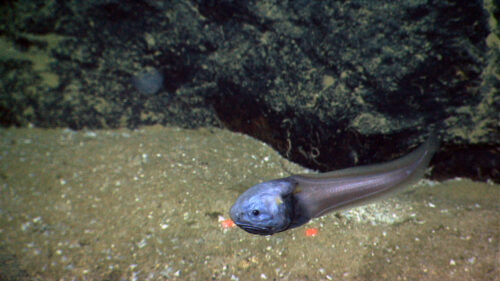Image courtesy of Sarah T. Friedman
When we think about global warming, many of us visualize melting ice caps or lament the threat of mass extinction, undoing the work done by millions of years of evolution. But could climate change also threaten the forward progress of evolution? A recent study investigating the role of changes in water depth in the rapid speciation, or formation of new species, of fish in polar latitudes strongly suggests that yes, global warming could affect evolution’s progress. The study specifically points to the potential negative impact of warming waters on the ability of fish to rapidly speciate and, therefore, further their evolution.
Published by Yale researchers Sarah Friedman and Martha Muñoz, the paper addresses the relationship between the remarkably rapid speciation rates of fish in polar latitudes and the ability of those polar fish species to move through the “depth gradient”—the intervals of water depth populated by different fish species in a body of water. By mapping the evolution of depth occupation across species of fish, the researchers were able to support their hypothesis that the ability of fish species to traverse water depths may act as an engine for biodiversity.
Friedman was prompted to explore this idea after reading a paper that revealed that despite the higher biodiversity among fish in tropical regions, fish in the polar regions show faster rates of speciation. This discovery was both utterly surprising and intriguing to Friedman, who worked with Muñoz—an assistant professor of Ecology and Evolutionary Biology at Yale—to pursue research that could further probe this finding. “When you look at the global scale, you’re going to see more species in the tropics,” Friedman said. “But what they found was that speciation rates are actually fastest towards the poles, which is [a] really interesting and counterintuitive result.”
After intensive research into the prior literature on this phenomenon, Friedman hypothesized that shifting water depth may be the mechanism for rapid fish speciation in polar latitudes. The presence of deep waters in polar latitudes seemed to lower the barrier for fish to move across the depth gradient, allowing for more physical space between fish groups. This separation promotes more rapid speciation than in shallow, lower latitudes, where more barriers prevent fish from creating space between one another, thus slowing speciation.
To investigate their hypothesis, the researchers used phylogeny, a common evolutionary biology technique that visualizes the ancestry and genetic relationships between different groups through the creation and analysis of phylogenetic trees. Because of limitations caused by the COVID-19 pandemic, Friedman and Muñoz analyzed existing data on fish evolution in this meta-analytic approach to reach their conclusions about biodiversity and speciation rates in polar-region fish
By the end of their extensive research, the team’s findings supported their hypothesis. “I think it was really reassuring to find what I hypothesized to be true,” Friedman said. “Those clades that are rapidly speciating are also those ones that are moving across the depth gradient pretty rapidly as well.” The relationship between rapid speciation rates and the ability to traverse a wider depth gradient explained the surprising speciation rates in the polar latitudes.
Friedman and Muñoz also consider other individual findings from their study to be particularly intriguing, including one that suggested a pipeline of biodiversity exchange across latitudes, particularly from polar to tropical latitudes. “In fact, what we discovered is that speciation is faster at the poles, reflecting greater depth transitions, and that diversity is later transported to the tropics, so the polar regions are actually supplying species to the tropics,” Muñoz said.
What could these findings mean for biodiversity and speciation in the era of extreme climate change and warming waters? According to Dr. Friedman, the effects will be disastrous. Because of the constant cold of the poles, there is little difference in water temperature throughout the depth gradient, meaning that the fish species through the gradient in the poles are similarly adapted for temperature, which contributes to how easily polar fish move between shallow and deep water. “As temperatures, and especially those surface temperatures, start warming up due to global warming, it’s going to increase the barriers to moving along that gradient,” Friedman said. Could global warming stall evolution? According to the researchers, this may be an extreme conclusion. Nevertheless, their research opens our eyes to a previously unknown harm of climate change, re-emphasizing the need for meaningful action.

